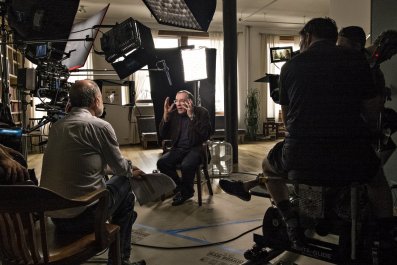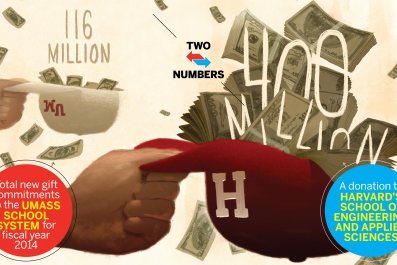Just a decade ago, we thought we might all wind up with an online alter ego—an avatar—that we each created and controlled, maybe molding it into the person we wish we were, like with muscles or charm or a T. rex head. It was the idea behind the virtual world Second Life, not to mention too much science fiction.
But that's not the way it's turning out. We're each creating a digital doppelgänger, all right, whether we want to or not. This creature is not who we wish to be—it's a raw, unfiltered, brutally revealing version of ourselves, built on our dossiers of clicks, keystrokes, swipes, likes, transactions and check-ins, absent whatever inner belief system drove them. If a soul is who you are no matter what everybody else sees, this digital you is the opposite of a soul: It is all action and no intention. No amount of church can save it—or retroactively alter it.
Apple CEO Tim Cook got a lot of ink recently by saying he is worried about your online privacy. And polls show the public is becoming more concerned about this issue, even though—as with global warming or an addiction to french fries—we tend to just keep doing what we've been doing and hope for the best.
But the issue is way more profound than anything Cook crabbed about. You are creating a version of yourself that will affect your future job interviews, loan applications and dates. For a wee glimpse of what's coming, try out a site called Digital Shadow. The first words you see will be: "You are not an individual. You are a data cluster." It gets weirder from there, guessing your salary or pointing out friends who might betray you, based only on your data trail.
Your digital self will gradually get fleshed out—even emotionally. Consider the potential of the new version of Google Photo. You give it your digital photos, and the software scans them for faces and situations, comparing the images with what it has learned from the billions of other photos in its system. It can recognize and tag people, places and things, so you can find that photo of you and your siblings by the statue of David. Google says it soon will also be able to recognize emotions, like whether you're happy or angry in a photo. By analyzing the emotions in a big enough collection of images, Google could start understanding your relationships to friends, family, colleagues—a way to "know" you that goes far beyond tracking search history.
Facebook might already know you better than your spouse does. One academic study, published last year by the National Academy of Sciences, showed that a computer model built using someone's Facebook likes can judge the person's personality traits more accurately than can friends or even family members. In fact, the analysis can even do a good job "predicting life outcomes such as substance use, political attitudes and physical health," the researchers reported. Imagine how that might play out if mixed with a dating site or job interview.
The range of actions being turned into data is staggering. Online retailers like Amazon know what you buy. Netflix knows your taste in
movies; Spotify has your music preferences. Uber knows where you go and when. Tinder knows what you're looking for in a one-night stand. LinkedIn knows what you're good at. Seamless knows what you eat. News sites see what you read. Google knows what you write in Gmail and their calendar charts how you spend your time. And now Google's Nest can tell who is in your house at what times of the day. If Google manages to make Google Glass popular, the company could collect data on everything you see.
All of it could feed into a more robust, authentic digital you. And new kinds of companies are popping up to interact with that version of you. In finance, Lenddo spent about three years proving that it could analyze the Facebook data of loan applicants to understand who would pay back the loans—a more accurate credit rating than a credit rating. It has used its system to lend money to thousands of people in developing countries who never had a bank account. Now it's selling the technology to financial institutions.
One of the hottest areas of venture capital investment right now is insurance tech. Insurance is likely to shift in the next decade to analyzing the digital you, the "you" who can't fudge anything. The insurance you buy for your home, car, health or life will be completely dependent on the behavior of your digital you.
As more industries find that your digital self accurately predicts how you'll perform in real life, digital you will become your representative—a required pit stop on the way to a first date, a visa to get into another country, admittance to a college or approval to buy a house by the neighborhood board. The avatar you are creating today will determine your future.
No single entity can put all your data together in one place, although Facebook and Google already knows enough about frequent users to nearly replicate them. But just as you now have to let a mortgage broker look at your finances to buy a house, a prospective employer or insurer will require you to let them see your data. They will make you introduce them to your digital self.
This development is not de facto bad. For some, it might be great. If your digital self predicts that you will be a safe driver, you'll pay less in car insurance. In a way, this is taking us back to an era of small towns, when the people and businesses you interacted with knew your family, your history, your true nature. In the movie It's a Wonderful Life, Jimmy Stewart lends locals money because he knows them. As Lenddo is now showing, that's the future of banking, not just its nostalgic past.
Yet like any technology, the creation and release of our digital doppelgängers could be trouble, used to influence or control us in ways we currently can't comprehend. That seems to be what Cook was getting at in his fiery speech this month at the Electronic Privacy Information Center's Champions of Freedom event. "You might like these so-called free services, but we don't think they're worth having your email, your search history and now even your family photos data-mined and sold off for God knows what advertising purpose," he said. "And we think someday customers will see this for what it is."
That someday is now. Your other you has already been born.















